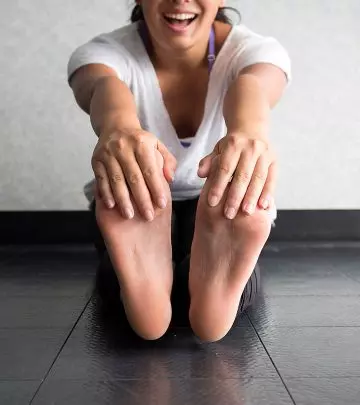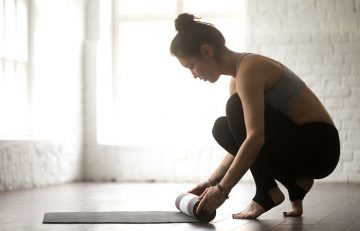Touch The End Of Your Toes To Know If You Have A Heart Problem Or Not

Image: Shutterstock
Now that you’ve clicked on this article after reading the title, we can tell that you are concerned about the health of your heart. You should be, considering the fact that cardiovascular diseases are the number 1 cause of deaths, across the world (1).
Are you worried that the stress of your work or personal life has been impacting the health of your heart? Or is it your advancing age that has got you worried? Whatever may be the reason, we are here to tell you that you are right to be concerned about your heart. Our heart is a very robust organ that doesn’t get affected easily, but the problem arises due to the fact that when it does start getting affected or malfunctioning, it becomes quite difficult to discern it.
You Need To Pay Attention To The Signs
Heart problems present themselves in ways that they often get confused for other symptoms. In fact, women experience the symptoms of heart problems quite differently than men. Men with heart problems have been found to exhibit symptoms such as pain in the center of their chest, or the feeling of something heavy sitting on their chest (2).
Women’s symptoms differ from men. The symptoms don’t present themselves as the traditional pain in the chest, rather they experience pain in the jaw, neck, back, and even abdomen (3).
Keeping these facts in mind, it becomes more important that we keep a tab on the health of our heart and look out for tell-tale signs. Scientists have recently discovered a new method of determining the health of our heart. Curious to know what that is? Read On.
The “Touch-Your-Toes” Test
After reading the name of this test you must be wondering how this type of test can ascertain the condition of our heart. You’re right in thinking that such a test can help one ascertain one’s flexibility, but this can also help one ascertain how flexible their blood vessels are. In this manner, it can tell you in advance if you’re likely to experience a problem with your heart.
This is because healthy blood vessels which are elastic in nature, help in moderating blood pressure. But as we age, these blood vessels start losing their flexibility and start putting pressure on the heart, which puts us at risk of cardiovascular issues. The logic behind this test is that people who are physically fit and flexible might possibly set in motion a range of physiological reactions that can delay age-related arterial stiffening (4).
This Is How You Do It
To do this test properly, follow the steps given below:
- Put a yoga mat on the floor, and sit on it with your back against a wall.
- Slowly push your arms forward by bending at the waist.
- Push your arms as far as you can, without straining them too much.
If you were able to reach your foot or even towards the end of your calves, it is a sign of good flexibility, and your heart is in mint condition. Interestingly, the research found that the results of this test were quite accurate in the case of middle-aged and elderly participants, but less so, for the younger ones. So, if you fall in the younger age bracket there are some other signs that you can look out for to make sure that your heart is in the pink of its health.
Don’t Ignore These Signs
Apart from the test mentioned above, we would advise you to be on the lookout for the following signs (5):
- Nausea, vomiting, heartburn: This and even stomach pain can be a symptom of heart trouble, especially in women.
- Pain in left arm: Pain that spreads from the chest to the left part of the body or is only felt in the left arm.
- Dizziness: This can be due to many reasons, but you need to consult a doctor immediately if you experience shortness of breath and discomfort in your chest, along with it.
- Throat or pain in the jaw: Again, this can be a signal of many things, but if you feel that the pain is radiating from your chest towards your jaw, you need to consult a doctor.
- Sweating for no reason: If you’re breaking into a sweat for no apparent reason, you need to consult a doctor.
- Swelling in legs, feet, and ankles: This can be due to many reasons, even water retention, but it can also be a signal that your heart is not able to pump your blood effectively and that blood is backing up into your legs.
If you are keeping a keen eye on these danger signs and are leading a healthy lifestyle, paying enough attention to your nutrition, and exercise, then you can rest assured that your heart will remain hale and hearty for a long time to come. In any case, if you experience any discomfort or are concerned about something, we would advise you to discuss those concerns with your doctor.














